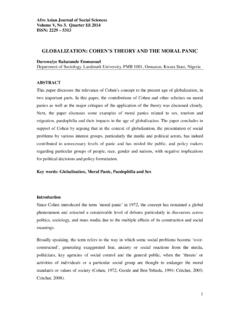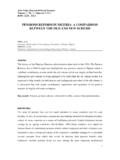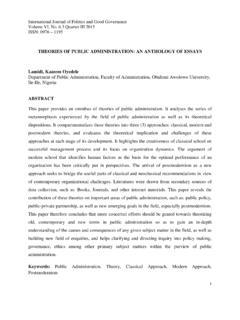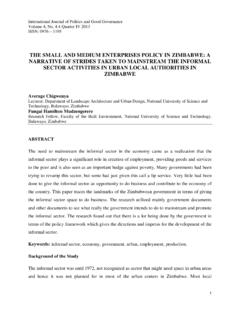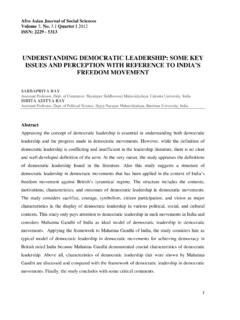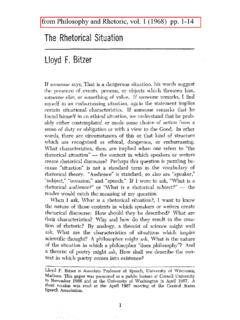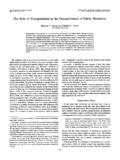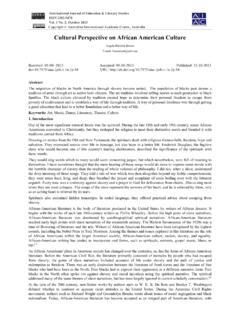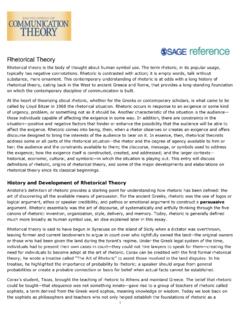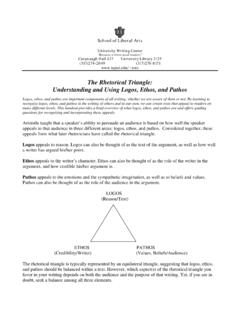Transcription of MODERNIZATION THEORY AND ‘THIRD WORLD’ …
1 International Journal of Politics and Good Governance Volume VIII, No. Quarter II 2017 ISSN: 0976 1195 1 MODERNIZATION THEORY AND THIRD WORLD DEVELOPMENT: AN EXEGESIS OF THEORETICAL SARCASM Jacob Tagarirofa Great Zimbabwe University, Department of Sociology and Anthropology, Zimbabwe ABSTRACT The essay sought to explore the efficacy of MODERNIZATION THEORY as a pragmatic development model for developing countries. This endeavor was enabled through a cross-examination of the salient tenets of the MODERNIZATION THEORY s prescriptions. The exegesis was premised on the interface of the MODERNIZATION paradigm with the multifarious social, political and economic realities of the developing countries. The paper adopted a multi-case study approach in which findings were based on different socio-economic and political cases of developing countries, insofar as the efforts to modernize were not particular but universal.
2 As such, it sought to qualify the hypothesis that, the applicability of MODERNIZATION THEORY as a development model has been rhetorical than sincere, a mere sarcasm. Methodologically, the paper was qualitative inasmuch as it thrived on historical analysis of the emergence and propagation of MODERNIZATION as a THEORY and an ideology, and its ramifications on Third Word countries development conundrum. Among other findings, the paper confirmed that, the MODERNIZATION THEORY was rhetorical since it indirectly perpetuated the social, political and economic impasses which it sought to provide remedy for. Key Words: MODERNIZATION , development, third world countries, western hegemony, policies Introduction and Background The genesis of the MODERNIZATION paradigm has been historically attributed to three fundamental events in the Post World War II epoch, namely, the ascendance of United States as a super power; the propagation of the communist movement; and the disintegration of the European colonial empires in Asia, Africa and Latin America which culminated in the proliferation of new nation-states which categorically became the Third World (So, 2010: 17).
3 The quest for development and political independence by these emerging states seems to have justified the need for a new model of development which would enable and catalyze positive social transformation of these so called International Journal of Politics and Good Governance Volume VIII, No. Quarter II 2017 ISSN: 0976 1195 2 backward countries. Turlock (2015:19) remarks that, it in this context where American political elites embarked on an intensive and extensive research of Third World countries in order to proffer solutions for economic development and political stability so as to avoid losing these new states to the Soviet communist bloc . These are some of the outcomes of the research; the need for repudiation of traditional cultures as they were antithetical to development, the prescription of a stimulus in the form of a political revolution or technological change, the recommendation that capital and expertise are preconditions for take off and the proclamation of the need for free market principles.
4 It is from this background that the writer intends to interrogate the feasibility of adopting this THEORY as a model of development and panacea for the social, political and economic emancipation of developing countries. The paper shall disapprove the perceived positive attributes of this model based on a cross-examination of the main tenets of evolutionary, functionalist, and capitalist ideas that informed MODERNIZATION theorizing against the contemporary social, political and economic realities. MODERNIZATION s Repudiation of Third World Traditional Cultures The MODERNIZATION THEORY called for a complete overhaul of third world cultures as they were seen as antithetical to development (Coetzee, 2011). Ironically, a multiplicity of ethno development studies has revealed instances where culture has positively contributed to social, political and economic development.
5 A case in point is Burma and Sri Lanka which have adopted Buddhist economics stressing cultural traits of cooperation and self-sufficiency and the resultant positive attributes of such cultural ideology on the economic stabilization of these countries (Cherill, 2016). In Africa emphasis has been on rural development strategies based on the traditional egalitarian values of African communalistic societies (Brohman, 2005). This African development orientation has culminated in the institutionalization of participatory development in most development endeavors which put the beneficiaries as core and active participants in development efforts that are meant to change their welfare (Tagarirofa and Chazovachii, 2014). Besides, Japan s economic progress has been attributed to its use of Confucianism , a cultural trait which celebrated the transfer of ones family loyalty to the country, especially in industries and organizations (Aspalter, 2006).
6 It is therefore the writer s view that, MODERNIZATION s call for the deconstruction of traditional International Journal of Politics and Good Governance Volume VIII, No. Quarter II 2017 ISSN: 0976 1195 3 values was premised on crude determinism given the positive attributes of culture in informing sustainable solutions to economic and social problems. Its characteristic deficiency of the true picture of what prevailed at micro-scale in those so-called third-world countries vindicates its nullity as a model for developing countries. Indeed, development policies informed by models which are based on porous conceptualization of other societies are not only inapplicable, but, strategically dysfunctional if positive social transformation is to be achieved in developing countries.
7 As such development policies for developing countries should be internally driven particularly informed by internal social, political and economic arrangements rather than being externally superimposed. The examples above refute the erroneous notion of traditional cultures as hostile to development since most developing countries developed within paths conceived and informed by their socio-cultural and political organization. It would then be absurd if not ludicrous to envisage any model of development for developing countries to adopt this fallacious MODERNIZATION inclination, especially if it is to be used to sincerely inform pragmatic paths for positive transformation. The Paradox of Development as a Linear Process Rostow distinguished five stages of social transformation in his attempt to justify that development is a linear or phased process, which are, traditional society, preconditions for take off, take off, the drive to maturity and the age of high massive consumption(So, 2010).
8 This assumption has received scathing criticism from Le Roux and Graff (2010: 54) who contend that, Rostow forces the rich and diverse histories of many countries into a single stage of growth model . By the same token, Marx s historical materialism has been rebuked on the basis that it assumes that social transformation is predetermined (So, 2010). The writer notes that this is at crossroads with Giddens (1984) Structuration THEORY which recognizes that human beings should not be taken as passive recipients of external stimuli since they have the agency , ability to embark on rational decisions and actions. This follows therefore that, rather than adopting dictated models as inevitable, individual countries can conceive their own modus operandi which correlates with their interests at that particular moment for example Zimbabwe s current indigenization policy which seeks equitable distribution and empowerment of the locals from the dividends of most capital projects such as mining.
9 One is therefore justified to argue that, the MODERNIZATION THEORY suffers from a International Journal of Politics and Good Governance Volume VIII, No. Quarter II 2017 ISSN: 0976 1195 4 credibility crisis in terms of application, because, it assumes a position of universal applicability, a deliberation which exposes its gross disregard of the variability of social, political and economic circumstances that characterized societies in every historical epoch. This view is complemented by Brohman (2005: 125) who asserts that, knowledge about the development process at a particular time does not exist in transferable form; rather it is the product of the development process itself . The writer notes that this assertion seems tenable because, for example, the fact that Turkey triumphed through MODERNIZATION rests on the assessment of the conditions that precipitated into its success story on the comparative basis of the different variables in other countries where MODERNIZATION has aggravated the underdevelopment it sought to remedy such as in Africa.
10 As such, one would safely say, the MODERNIZATION model is of questionable functionality if Rostow s assumption was meant to be inevitably accepted as rigid. The Irony of Development Stimulus Rostow also alluded to the need for a stimulus to propel Third World countries beyond the precondition stage, in the form of a political revolution that restructures major institutions, technological innovation and favorable international environment (So 2010). Rostow s prescription of technological innovation and favorable international environment as subsequent conditions seems rhetorical since developed countries such as United States had already affirmed authority on the international arena. It is the writer s opinion that, if Rostow mentioned these conditions whilst conscious of the indisputable fact that these conditions were susceptible to manipulation by industrialized countries, where the World Bank, International Monetary Fund and World Trade Organization enjoy an uninhibited latitude of freedom in determining borrowing rates, conditions and trading partners, the MODERNIZATION model can therefore be summed as a neoliberal intention of perpetuating and sustaining Western cultural and economic hegemony as the Dependence THEORY would argue.
